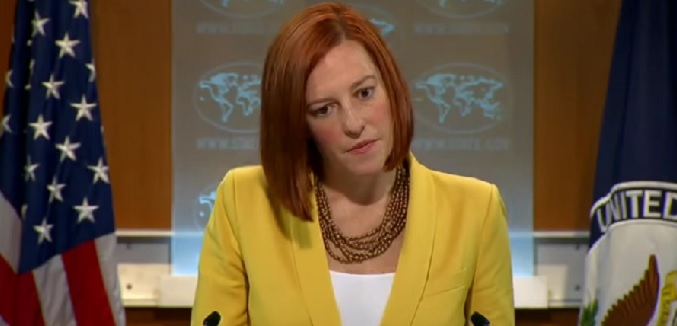Veteran journalists took turns at Wednesday’s daily State Department press briefing aggressively questioning the wisdom and coherence of the Obama administration’s approach to a recently appointed Palestinian unity government – agreed to by the rival Hamas and Fatah factions – hours after rockets fired from the Hamas-dominated Gaza Strip struck a major road in southern Israel.
Veteran Associated Press diplomatic writer Matt Lee on Wednesday pressed State Department Spokesperson Jen Psaki on how that position could be maintained in light of that morning’s rocket attacks. Psaki’s answer – that Palestinian Authority (PA) President Mahmoud Abbas had condemned the attacks but was unable to stop them – triggered another round of questioning:
QUESTION: Well, okay. So the Israelis say that President Abbas, since the unity government has been formed, that he bears responsibility for not disarming this or not preventing this attack and attacks of its kind. Do you agree that President Abbas shares – or it is his responsibility to do that, and that he is – the Israelis could look at him and say this is his fault?
MS. PSAKI: Well, we believe that President Abbas must do all in his power to prevent deterioration in the security situation, but we would also note that he has upheld his responsibility to maintain security coordination with Israel and he has publicly stressed his commitment to do that. And so I think he has made every effort to be – continue to be a partner in this regard.
QUESTION: So this doesn’t have any – this attack doesn’t have anything – won’t have any bearing on your decision to work with the unity government and continue to provide assistance to it?
MS. PSAKI: It does not. Obviously, we’re concerned about it and we condemn it in the strongest terms. But his – President Abbas’s ability to impact these type of attacks is really severely limited at this point in time.
QUESTION: Well, yeah, but isn’t that part of the – I mean, that’s part of the entire problem with agreeing to go along and work with a government, is it not? I mean, the Israelis said the whole time that these attacks are going to continue. If you recognize that his ability is extremely limited to prevent this kind of thing, for there to be security cooperation between him, his government, and the Israelis, how is it that you made the leap to go ahead and say, “All right, this is a government that we can do business with?”
MS. PSAKI: Well, this is one – this was the creation of an interim technocratic government. Obviously, at some point there will be elections. This is an interim period. As we’ve long stated, we’ll – we’re continuing assistance if we – but we’ll be watching closely and if something changes, so will – we’ll act accordingly. But nothing —
The Israelis held the new Palestinian Authority (PA) cabinet, which has formal jurisdiction over Gaza and is treaty-obligated to seize the illegal rockets inside the territory, responsible for the attack. Washington has committed itself to working with and funding the new PA government.
Lee questioned the geopolitical judgment behind supporting such a reconfigured and incapacitated PA:
QUESTION: So but then I don’t understand why – I can’t – I mean, if you think that this guy doesn’t have control over everyone who is either a member of or is backing his unity government, why would you do business with it? Why would you give it money? I mean, if you were one part of – I don’t know, one segment of the Israeli society, political society or otherwise, you could, if you hold Abbas responsible for this attack, hold the United States, in a sense, responsible for this attack because you guys are just continuing to support the unity government.
MS. PSAKI: Well, as you know, there are no members of Hamas in the technocratic unity government – technocratic government, I should call it, which is the accurate —
QUESTION: Right.
MS. PSAKI: — term for it. That is one of our criteria for continuing to provide assistance. We’ll be watching closely over the course of the coming weeks and months.
QUESTION: So even though it is backed by Hamas and you hold Hamas responsible for this rocket attack today, that – you don’t see a connection? No?
When Psaki persisted in asserting that the U.S. would continue to fund the unity government, Reuters journalist Arshad Mohammed stepped in to ask why Washington was unwilling to use its leverage in order to stem the projectile fire:
QUESTION: Why is it in your interest to continue to deal with the interim government notwithstanding this rocket attack?
MS. PSAKI: Because the Palestinian people and our relationship with the Palestinian Authority is an important relationship to the United States. We continue to believe that support to them is something that is important to the United States.
QUESTION: But if Hamas feels that it can shoot rockets from Gaza into Israel with impunity and this has no effect whatsoever, for example, on its ability to form a unity government with the PA, even if there are no Hamas members in the actual government – you have a disincentive that you could use here, which would be to stop dealing with the unity government or to stop funding it, and that might tell Hamas, “Well, maybe we should think twice about sending rockets in.” But the way you’ve cast it, they can send an unlimited number of rockets in and they can still be supportive of this unity government and you’ll still give the unity government and the PA money.
[Photo: U.S. Department of State / YouTube]




